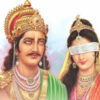In the vast tapestry of human history and literature, myths and legends have always served as mirrors that reflect our own virtues and vices. These stories, while rooted in antiquity, continue to hold relevance in modern times by offering valuable insights into our nature. One such striking character is Duryodhana from the ancient Indian epic, the Mahabharata. Often perceived as the embodiment of greed, envy, and arrogance, Duryodhana’s presence in the epic raises a pertinent question: Does Duryodhana’s essence still reside within us today?
While the story may be ancient, the characteristics exhibited by this flawed character are not confined to the pages of mythology. In today’s world, we can find shades of Duryodhana’s traits in various aspects of our society and within ourselves. It’s my honest effort to explore how Duryodhana’s essence continues to influence human behavior, often leading to negative consequences.
1. The Pursuit of Power
One of the most prominent aspects of Duryodhana’s character was his insatiable hunger for power. This pursuit of power can still be observed in contemporary society, be it in the political arena, the corporate world, or even personal relationships. Individuals often prioritize their ambitions over ethical considerations, leading to a relentless quest for influence and control. This hunger for power can manifest itself in various ways, such as political corruption, workplace manipulation, or even toxic dynamics within families.
e.g. Corruption
Instances of corruption, where leaders misuse their power for personal gain, are regrettably common. They prioritize their own interests and wealth accumulation over the welfare of the people they are supposed to serve. This echoes the essence of Duryodhana’s character, highlighting how the pursuit of power can corrupt individuals and institutions.
2. Envy and Jealousy
Duryodhana’s deep-seated envy and jealousy towards his cousins, the Pandavas, eventually led to the devastating Mahabharata war. Similarly, envy and jealousy remain prevalent in our society today, often resulting in conflicts, rivalries, and a toxic social environment. Social media exacerbates these negative emotions, as people compare their lives with others, leading to feelings of inadequacy and resentment.
Example: Media and the Culture of Envy
The advent of social media platforms has amplified the culture of envy in our society. People curate their lives to present an idealized version of themselves, showcasing their achievements, possessions, and experiences. This can trigger envy and jealousy in others, creating a constant cycle of comparison and dissatisfaction. The need for validation and the fear of missing out (FOMO) have become widespread, perpetuating the darker side of human nature.
3. Ego and Arrogance
Duryodhana’s ego and arrogance were significant contributors to his downfall. His refusal to apologize and admit his mistakes caused resentment among his peers and enemies. He also refused to accept advice from those who had his best interests in mind. As a result, he made many poor decisions which ultimately led to his downfall. Similarly, in contemporary times, ego and arrogance can blind individuals to their mistakes, inhibit personal growth, and damage relationships.
Example: Corporate arrogance
In the corporate world, we often witness the destructive impact of ego and arrogance. Business leaders who prioritize their own interests, disregard feedback, and dismiss alternative perspectives can alienate employees, hinder innovation, and lead their organizations down a treacherous path. This echoes Duryodhana’s arrogance, where his refusal to acknowledge his mistakes ultimately led to his tragic fate.

4. Discrimination and prejudice
Duryodhana’s unjust treatment of the Pandavas based on their birth and social standing reflects the prevalence of discrimination and prejudice in modern society. Discrimination based on race, gender, caste, or religion continues to persist, highlighting that the seeds of Duryodhana’s behavior are still deeply rooted in our collective consciousness.
Example: Systematic discrimination
Systemic discrimination is evident in various spheres of life. Institutional biases, unequal opportunities, and prejudices based on factors such as race, gender, and socioeconomic status continue to marginalize certain individuals and communities. This perpetuates a cycle of inequality and social division, mirroring Duryodhana’s discriminatory mindset and his treatment of the Pandavas.
5. Lack of empathy and compassion
Duryodhana’s lack of empathy and compassion for others is a fundamental aspect of his character. Unfortunately, this trait is still prevalent in our society, often leading to callousness, apathy, and a disregard for the well-being of others.
Example: Social Indifference
Social indifference can be observed through acts of apathy and a lack of empathy towards marginalized groups, societal issues, and global crises. The ability to turn a blind eye to the suffering of others is reminiscent of Duryodhana’s lack of compassion for the Pandavas and his inability to empathize with their struggles.
The character of Duryodhana from the Mahabharata represents a timeless archetype of human flaws and negative tendencies. While the epic itself may be centuries old, the essence of Duryodhana’s existence continues to resonate in today’s world. The pursuit of power, envy, ego, discrimination, and a lack of empathy are just some of the traits that can be observed in various aspects of our society and within ourselves. Recognizing and addressing these darker aspects of human nature is crucial for personal growth, social progress, and the cultivation of a more compassionate and harmonious world. By recognizing the echoes of Duryodhana within ourselves and within society, we can strive to be better, to build a world where greed gives way to generosity, envy is replaced by celebration, and discrimination yields to inclusivity. Let us embark on this journey of transformation, embracing our capacity for growth and forging a brighter future for all.
Avoiding the traits of Duryodhana requires conscious effort and a commitment to personal growth. Here are some steps you can take to avoid embodying his character:
- Cultivate Self-Awareness: Develop a deeper understanding of your own thoughts, emotions, and behaviors. Reflect on your motivations, biases, and tendencies. This self-awareness will help you identify any Duryodhana-like traits within yourself. Regular journaling about your experiences, emotions, and reactions can provide insights into your own patterns and behaviors.
- Practice Empathy and Compassion: Foster a genuine concern for the well-being of others. Seek to understand their perspectives, struggles, and experiences. Treat others with kindness, empathy, and respect. Engage in acts of kindness, such as volunteering for a cause you care about or actively listening to someone in need of support.
- Embrace humility: Stop being arrogant and right all the time. Acknowledge and learn from your mistakes. Be open to feedback and different viewpoints. Instead of asserting your opinion in a discussion, take a step back, actively listen to others, and consider their perspectives before responding.
- Reject envy and comparison: Avoid falling into the trap of comparing yourself to others. Celebrate their accomplishments and focus on your own growth and progress. Practice gratitude by keeping a gratitude journal, where you regularly write down things you are grateful for, shifting your focus to the positives in your life.
- Foster Inclusivity and Equality: Strive to treat all individuals with fairness and respect, regardless of their background, race, gender, or social status. Actively challenge your own biases and prejudices by seeking diverse perspectives, engaging in conversations with people from different backgrounds, and supporting inclusive initiatives.
- Practice Ethical Leadership: If you hold a position of influence or authority, lead with integrity, transparency, and a genuine concern for the well-being of those you lead. Encourage open communication, provide opportunities for growth and development, and make decisions that prioritize the collective good rather than personal gain.
- Continual Self-Reflection and Growth: Regularly assess your progress, identify areas for improvement, and commit to ongoing personal development. Engage in activities such as reading books, attending workshops, or seeking mentorship to enhance your understanding of ethics, empathy, and personal growth.
By consciously practicing these steps and consistently aligning your actions with positive values, you can actively avoid embodying the traits of Duryodhana and contribute to a more compassionate and harmonious world. Remember, change starts from within, and every small step you take matters.
A writer of this blog is an experienced Global Career & Education advisor, helping parents to plan and manage global education of their children. You can share your feedback / reviews or connect with him on makarand.bhatt@yahoo.com












